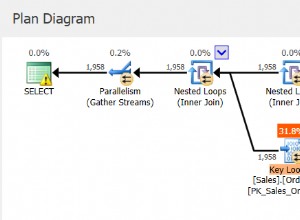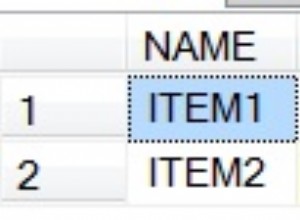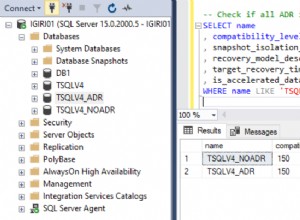Type de commande contient des noms qui spécifient comment une chaîne de commande est interprétée.
CommandType.Textpour une commande de texte SQL. (Par défaut.)CommandType.StoredProcedurepour le nom d'une procédure stockée.CommandType.TableDirectpour le nom d'une table .
Toutes les lignes et colonnes de la table nommée seront renvoyées lorsque vous appelez l'une des méthodes Execute.
REMARQUE :TableDirect est uniquement pris en charge par le fournisseur de données .NET Framework pour OLE DB . L'accès à plusieurs tables n'est pas pris en charge lorsque CommandType est défini sur TableDirect .
Exemple d'exemple d'utilisation :
OleDbConnection myOleDbConnection =new OleDbConnection("provider=sqloledb;server=(local)\\SQLEXPRESS;database=MyDatabase;Integrated Security=SSPI");
OleDbCommand myOleDbCommand = myOleDbConnection.CreateCommand();
myOleDbCommand.CommandType = CommandType.TableDirect;
myOleDbCommand.CommandText = "Employee";
myOleDbConnection.Open();
OleDbDataReader myOleDbDataReader = myOleDbCommand.ExecuteReader();
for (int count = 1; count <= 2; count++)
{
myOleDbDataReader.Read();
Console.WriteLine("myOleDbDataReader[\" ID\"] = " +
myOleDbDataReader["ID"]);
Console.WriteLine("myOleDbDataReader[\" FirstName\"] = " +
myOleDbDataReader["FirstName"]);
Console.WriteLine("myOleDbDataReader[\" LastName\"] = " +
myOleDbDataReader["LastName"]);
}
myOleDbDataReader.Close();
myOleDbConnection.Close();
Insérer/Mettre à jour
try
{
using (SqlCeCommand command = conn.CreateCommand())
{
command.CommandText = "Holdings";
command.CommandType = CommandType.TableDirect;
using (SqlCeResultSet rs = command.ExecuteResultSet(ResultSetOptions.Updatable | ResultSetOptions.Scrollable))
{
SqlCeUpdatableRecord record = rs.CreateRecord();
foreach (var r in _commitBatch)
{
int index=0;
record.SetValue(index++, r.TryGetValueOrDefault("IdentifierFromImportSource",string.Empty));
record.SetValue(index++, r.TryGetValueOrDefault("SecurityID", string.Empty));
record.SetValue(index++, r.TryGetValueOrDefault("SecurityName", string.Empty));
record.SetValue(index++, r.TryGetValueOrDefault("SecurityType", string.Empty));
record.SetValue(index++, r.TryGetValueOrDefault("AllocationAmount", string.Empty));
record.SetValue(index++, r.TryGetValueOrDefault("Position", string.Empty));
record.SetValue(index++, r.TryGetValueOrDefault("AnnualFeePercent", string.Empty));
record.SetValue(index++, r.TryGetValueOrDefault("MarginAmount", string.Empty));
record.SetValue(index++, r.TryGetValueOrDefault("Price", string.Empty));
record.SetValue(index++, r.TryGetValueOrDefault("MorningstarSecId", string.Empty));
record.SetValue(index++, r.TryGetValueOrDefault("MorningstarSecType", string.Empty));
record.SetValue(index++, r.TryGetValueOrDefault("UserID", string.Empty));
record.SetValue(index++, r.TryGetValueOrDefault("MorningstarPrice", string.Empty));
record.SetValue(index++, string.Empty);
record.SetValue(index++, r.TryGetValueOrDefault("AnnualFeeFrequency", string.Empty));
record.SetValue(index++, r.TryGetValueOrDefault("TrackingMethod", "1"));
rs.Insert(record);
}
}
}
}
catch (Exception e)
{
NotifyError(this, new ImportErrorEventArgs(e.Message + e.StackTrace, ErrorLevel.Application));
}




